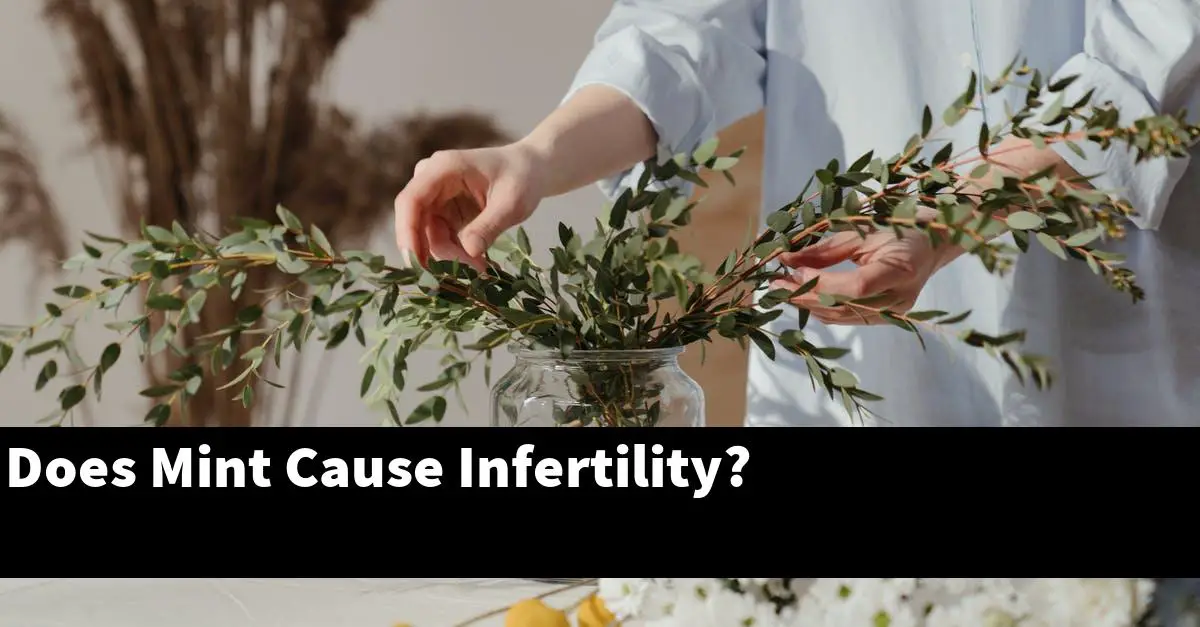Mint is a popular herb that is used in many dishes and as a flavoring for various products. Some people believe that mint can cause infertility, but there is no scientific evidence to support this claim.
Does mint affect your sperm?
There is limited evidence that mint affects sperm motility or fertility. However, there is some anecdotal evidence that mint may improve sperm quality.
Some studies have found that consuming mint may improve sperm function, while others have not found a link between mint and sperm quality.
Can mint affect fertility?
It is currently unknown whether mint can actually affect fertility. Some anecdotal evidence suggests that consuming mint may help improve fertility, while other studies have shown no clear link between mint and fertility.
Currently, there is insufficient evidence to support any specific claims made about mint and fertility.
What foods can make you infertile?
There are many foods that can make you infertile. Some of the most common culprits include smoking, drinking excessive amounts of alcohol, eating a high-fat diet, and using recreational drugs.
All of these activities can damage your reproductive organs and make it difficult for you to conceive a child.
How to reduce male fertility?
There are a few ways to reduce male fertility. Some ways are more natural and some are more technical.
Some ways to reduce male fertility are through lifestyle changes. These changes can include quitting smoking, exercising regularly, and eating a healthy diet.
Other ways to reduce male fertility are through medications. These medications can help to improve the quality of sperm, increase the number of sperm, or improve the ability of sperm to fertilize an egg.
Finally, some methods are used to surgically remove or block the tubes that carry sperm from the testicles. This can reduce the number of sperm that reach the egg.
Do herbs affect male fertility?
There is limited research on the effects of herbs on male fertility. Some preliminary studies suggest that some herbs may improve sperm quality, but more research is needed to confirm these findings.
Some herbs, including ginger and garlic, have been shown to have negative effects on sperm quality in some studies. It is important to speak with a healthcare professional before taking any herbs for fertility purposes.
Does old spice cause infertility?
Research on the matter is still ongoing. However, some experts believe that old spice may be linked to infertility because of its chemical composition.
Older Spice products contain high levels of chemicals such as cedarwood, which is known to have an effect on sperm production. Additionally, old spice products have been known to contain other ingredients that could harm fertility, including menthol and camphor.
As such, it is recommended that women who are trying to conceive avoid using old spice products as much as possible.
Does mint cause erectile dysfunction?
It can vary depending on each person’s individual physiology. However, there are some potential causes and effects of mint affecting sexual function that can be explored.
In general, mint can help to improve circulation and digestion, which in turn can improve overall sexual function. Additionally, mint is known to be a natural aphrodisiac, and can help to increase libido and arousal.
However, it is important to note that there is no evidence to suggest that mint can cause erectile dysfunction in and of itself. Rather, it may be helpful in improving overall sexual function.
Does clove cause infertility?
There is limited research on the effects of clove on fertility, but the available evidence suggests that it is not associated with an increase in infertility. Some people may experience an allergic reaction to clove, which may lead to fertility issues.
Additionally, the use of clove supplements may also have adverse effects on fertility.
Can eating too much spearmint cause infertility?
There is limited scientific evidence to support the claim that eating too much spearmint can cause infertility. However, there is some evidence to suggest that spearmint may have a negative impact on fertility.
Spearmint has been linked to a number of potential adverse health effects, including causing nausea and vomiting. Additionally, spearmint has been shown to interfere with normal hormone function.
In some cases, this interference can lead to infertility. However, it is not clear whether spearmint consumption specifically is responsible for these effects.
Overall, the available scientific evidence is inconclusive and suggests that there is not a clear link between spearmint consumption and infertility.
Is spearmint good for fertility?
Spearmint has been traditionally used to improve male fertility by aiding in sperm production. Some research shows that spearmint may have some benefits in increasing sperm motility and viability.
However, it is still unclear if spearmint is truly effective in increasing fertility. Overall, there is some evidence that spearmint may be beneficial for fertility, but more research is needed to confirm this.
Conclusions
Mint does not cause infertility. There is no scientific evidence to support the claim that mint causes infertility.

